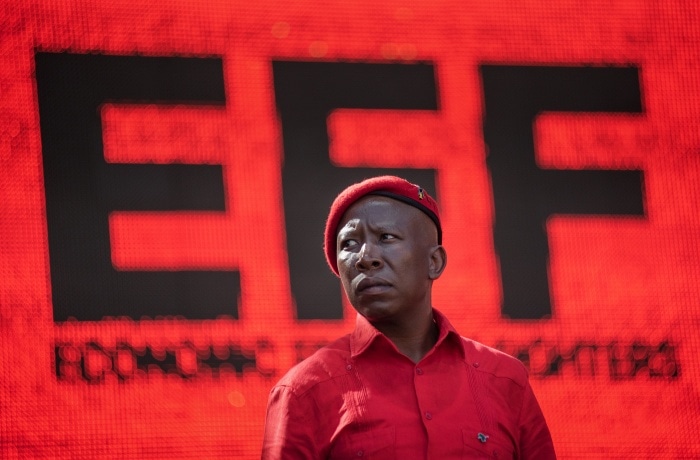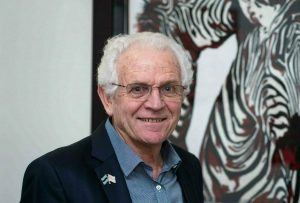By Paul Maritz
It is difficult to think of anyone who can direct as much media attention to him as Julius Malema, leader of the EFF, who today celebrates their tenth anniversary.
Despite all the media analyses, academic articles, and court records that try to analyze and contextualize Malema and his cadres’ words, it is much simpler to just look at what the EFF’s leadership says itself, and then judge for yourself. Sensational Malema comments are legion, but here are ten that should not be forgotten.
- “When we leave here, you will see any beautiful piece of land, you like it, occupy it, it belongs to you.”
With this quote in 2016, the EFF shouted from its first breath that private property rights are evil, and therefore that its followers should just occupy land. The bigger problem is that Malema is using the issue of property rights and land to spread his own propaganda, and to sow division.
- “This is Shaka Zulu’s country, not Van Wyk and Van Tonder’s country.”
Although he likes to call himself revolutionary or radical, land occupation for Malema is not only about the pursuit of a communist utopia where nobody owns anything, there is a very clear racial flavor to detect in his Leninism.
Ernst Roets elaborates on the impact of these types of comments on the “Van Wyks and Van Tonders” in his book Kill the Boer out. On occupation he states:
“It is like somebody saying to you: ‘Hey, this Mazda 323 belongs to you. I stole it. I’m sorry. But give me R100’. I will take your teeth out when I find you possessing my stolen vehicle. Why should you negotiate with a thug, the land thieves, the criminals!? The real criminals are not in the court.” (2016)
By convincing his followers that any land in white hands was stolen, and that white farmers are criminals, Malema not only spread falsehoods about history as truth, he also consciously sowed division with his propaganda.
- “There are no white farmers being killed in South Africa.”
Like many South African politicians, Malema is convinced despite the facts that there is no such thing as farm killings in this country. In 2020, he made this absurd comment outside the court in Senekal, after the murder of the 21-year-old farm manager Brendin Horner.
It is absurd precisely because it was outside the court after the murder of a farm manager. For Malema, sensational and worrying comments were of course not a new phenomenon by 2020.
- “They must be happy we are not beating them up, they must be happy we are not calling for genocide”
In 2016, Malema already started making these types of comments about white people.
- “There’s no crime I’ve committed. I’ve never slapped a white person, I’ve never called for their slaughter. I’ve never called for their killing, at least for now. I can’t guarantee the future.”
This statement of his in 2018 serves as his so-called defense for the latter type of comments.
One almost has to pinch oneself to confirm that one is not trapped in a trance or a nightmare. A member of parliament who openly declares that one day in the future he may call for the slaughter of members of a race, and the whole world closes their eyes and ears.
- “Before it was easier when there was Maimane but now we must talk to Helen and Steenhuisen? I cannot imagine that, it’s going to be difficult”.
Race over everything is not just Malema’s approach when he speaks to the masses outside the courts. In 2019, with the comment above, Malema makes it clear that even something as commonplace for a politician as coalition talks must be seen through the lens of race.
- “There is no black person who can be racist because they never, ever think that they are superior to any other race.”
Thus, the EFF is firmly convinced that this approach is not racist, as the EFF’s deputy president Floyd Shivambu indicated in August 2020 with this comment.
One would wonder what hostility towards someone purely based on their race is if it is not racism, because if it looks like racism, sounds like racism, and feels like racism, then surely it is racism?
- “The reason the workers were killed is because there is a highly connected political figure in that mine.”
During his speech at Marikana on 18 August 2012, when the EFF had not yet been officially launched, Malema made this statement. It should be noted that, in addition to racial issues, Malema and co’s tongue swords have also aimed a lot of jabs and jabs in the direction of their erstwhile employers, the ANC.
His comment was obviously aimed at President Ramaphosa, who at that stage was a shareholder in the mine in question.
- “Staged, managed Mandela, who compromised the principles of the revolution, which are captured in the Freedom Charter.”
Malema’s anger towards the ANC does not stop with Ramaphosa either. In 2015, he even went so far as to describe former president Nelson Mandela, after his release from prison, as above.
- “You must never be afraid to kill. A revolution demands that at some point there must be killing, because the killing is part of a revolutionary act.”
This comment by Malema from last year confirms the EFF’s political strategies. Ultimately, politics is a competition for popularity, and for Malema and his party it is clear that there is scope for revolutionary ideas and revolutionary gatherings. By looking for and blaming an enemy for everything that goes wrong in the country, and by identifying himself as the leader against this enemy, Malema brews the recipe that ensures him and his party seats on the gravy train.
There is little prospect that the EFF will use less provocative, defiant and divisive rhetoric in the next decade. Nevertheless, there is hope that more and more people begin to see through this party, that more and more people do not read the cute contextualizations of “what they meant”, but that more and more people read their own words, and believe those words.
- Paul Maritz is an independent commentator.








